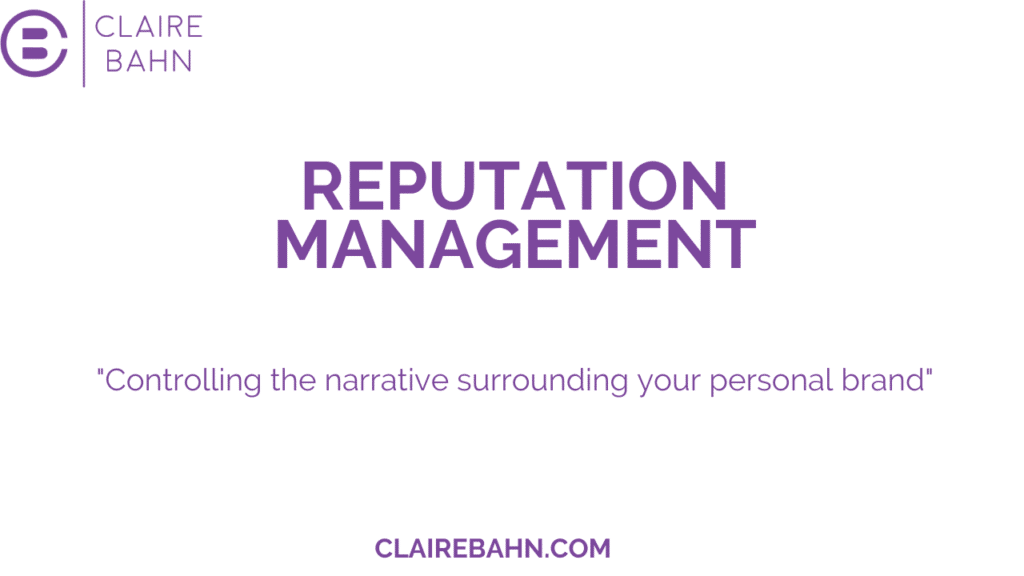I’m at my computer scrolling through my favorite LinkedIn groups when the term reputation management pops up on my feed.
Something about the phrase makes me stop immediately.
Over the years, I have been writing consistently about personal branding. And while the term is not new, there’s something about the phrase that continues to confuse people.
I see it all the time.
When people think of branding, they think of logos, brand colors, and their company’s vanity aesthetics. So when the phrase “reputation management” came across my feed, it felt like the perfect time to explain why your personal brand can be so influential — or detrimental — to your business and career.
As a personal branding strategist, my job is to help you define your personal brand. Your brand— especially these days— is how “Google-able” your name is. If your reputation precedes you, then you’ll probably find links to your website, book, social media accounts, and press on the first page of Google.
If nothing shows up, then you might need someone to help you manage your reputation and your personal brand.
RELATED: HOW TO BUILD A REPUTATION WITH YOUR ONLINE PRESENCE
What Is Reputation Management?
Before social media, Public Relations (PR) companies held the title for reputation management. However, in the current digital landscape, social media managers, content creators, and personal brand strategists are now offering this service as a part of a holistic way to manage their client’s online presence.
Managing someone’s online persona means not only creating professional and memorable content, but also involves coaching them on the proper way to receive criticism. A couple of years ago, I wrote a blog on “How To Take Constructive Feedback To Improve Your Bottom Line.” I talk to you about an encounter I had with someone who refused to accept criticism and how their adverse reaction spoke volumes to their reputation.
Between social media comments, Google, and Yelp reviews people will always find a way to let people know what they think about you or your business. The way you handle this criticism is just one aspect of managing your reputation, but one that we often overlook.
Suppose your instinct is to go on the defense when someone sparks negative comments about your personal brand. In that case, you’re going to create a snowball effect that can, ultimately, tarnish your reputation altogether.

4 Reasons You Need Reputation Management For Your Personal Brand
Do you even need someone else to help with your personal brand’s reputation?
You can outsource reputation management really at any stage of your entrepreneurial journey. However, you don’t want to wait until it’s too late.
You are in full control of what appears on your brand’s social platform. Besides the content you put out, however, your comments also play a role in how others perceive you. That’s why I always recommend that my clients remain mostly neutral when it comes to their online presence.
For example, in today’s political climate, it can be hard to know when to speak up and when to stay silent. My rule of thumb is to be overly cautious about what you say. The goal is to avoid controversial topics that can potentially harm the way people perceive your brand.
Here’s the catch: Sometimes saying nothing can do more harm than good. Before giving you specific examples of online reputation management, let’s discuss the four reasons you need it for your personal brand.
RELATED: 10 THINGS YOU NEED ON YOUR PERSONAL BRAND WEBSITE
1. Your name doesn’t appear in search results.
Maybe you’ve been putting out content for years, and you’re still not where you want to be in terms of having a recognizable personal brand.
Is it going to be too late to save it? Are people bored with your brand after all these years?
A personal branding strategist like me will help determine what we can do to salvage your brand. However, the best way to prevent this from ever happening is to get someone who understands reputation management to evaluate your content early on to see how we can make your brand thrive.
2. Your name is being pulled through the mud
You also don’t want to wait until your online presence receives scolding remarks to bring on a brand reputation manager. Granted, these things can happen literally overnight. The best plan of action is to get in front of it while the feedback is still positive. By teaming up with a reputation management coach the minute you start gaining traction, you’ll be equipped with an immediate plan of action to protect your brand.

3. You’re looking to elevate your personal brand
Your brand maybe somewhere in the middle. It’s surviving, but it’s not thriving. This is when someone like me can come in and do a dive into your personal brand to see what we can do to elevate your voice.
A large part of this is looking at how your audience is currently perceiving your brand. This means reading comments, analyzing press rejections, and doing some competitive research to see how others elevate their digital space reputation.
4. You need to rebrand
Rebranding is not a dirty word. Many people look at this as a sign of failure in their business or career, but it’s really the opposite. A rebrand is a sign you’re ready for growth. Whether the rebrand is a direct response to a reputation crisis or because you want to boost your brand doesn’t matter here. What matters is that it’s time to change your reputation, and you’re ready to take that step in the right direction.
RELATED: PERSONAL BRANDING FOR SMALL BUSINESS OWNERS

How Your Reputation Can Survive and Thrive
So what can you do to manage your reputation so that it survives and thrives? Here’s how I recommend you start:
- Create Consistent Content: If you’re starting with your brand, the first thing you need to do is to get people to notice you. You won’t be able to do this without engaging content. Consistency is arguably even more important than the quality of your content. The fact that people can rely on you to show up when you say you will (even if it’s just once a week) is a great way to build your online reputation.
- Engage with Your Audience: You can boost your social media presence by being social on social media. This means leaving comments on posts related to your industry, answering Direct Messages, and doing your due diligence to answer comments on your content as soon as possible.
- Get Your Name in the Press: If you have an active audience and consumable content, podcast hosts and journalists are likely more than willing to take a quote in your area of expertise for
- Keep Track of Your Online Reputation: The more your personal brand grows, the more susceptible your brand is to negative comments. Once you have consistent content, a growing audience, and regular press appearances, you need to keep track of the public’s reaction.
Your brand may be thriving, but is it going to survive? It all depends on the way you react. If you respond negatively or you simply don’t have time to keep track of it all, that’s when you need to hire someone for reputation management.
What Is An Example of Online Reputation Management?
2020 is a perfect example of why people need online reputation management. Personal brands received harsh feedback from the public throughout the entire year.
I mean, a lot was going on in 2020: a pandemic, a civil rights movement, the Great Mask Debate, and one of the most controversial political elections in our history.
In June 2020, Buzzfeed released this article called “12 People and Brands That Finally Realized Black Lives Matter This Week.” Vogue, NASCAR, Lady Antebellum, and even the Band-Aid brand spoke on BLM’s matters. Whether this was to “save face” or their genuine beliefs on the subject doesn’t matter in this situation. I’m just pointing out that these types of articles are precisely why you need to manage your reputation.
If your brand is big enough, you might even be pulled into these matters whether you like it or not.
RELATED: PERSONAL BRAND STATEMENT EXAMPLES & TIPS TO CREATE YOUR OWN
Examples of Bad Reactions
Two examples come to mind of audiences calling personal brands out to respond to these situations.
Jenna Kutcher made this post stating, “I have been called out” on June 7th, 2020. This is a shining example of managing your online reputation.
Except that this “apology” created even more backlash.
I won’t get into all the specifics of this situation, but ultimately the public had received Jenna’s apology poorly, and she lost thousands of followers because of it. It was eventually a Catch-22. Saying something the wrong way incited a significant reputation crisis, whereas saying nothing would have made her seem dismissive (and worse, defensive) over her past actions.
And that’s another aspect of brand management that people don’t consider. People called Jenna out for statements she made towards a fellow creator years ago. So that’s another thing to keep in mind: what you say today can wreck your reputation years from now.
Marie Forelo is another example. She wrote a blog apology that opens up with,
“Last week, I messed up. I disappointed people I care deeply about, and people who look up to me as a role model. I made the mistake of silencing the voices of the Black B-Schoolers in my FB group that needed to be heard during this time of deep pain….
Instead of creating a safe space for them to express their hurt and pain, I chose to temporarily close commenting without attempting to understand their point of view.”
I don’t have any doubt that this post was written after deep introspection and with careful thought of how to address the situation. However, it’s that knee-jerk reaction— the way she deleted comments in her Facebook group— that ultimately landed her in this situation in the first place.

Quick Tips For Managing Your Digital Reputation
It’s stressful, isn’t it? Feeling like you have to tiptoe around what you say for fear of future backlash?
Unfortunately, this is what comes with having a public persona and a personal brand. Your brand is active at all times. The minute you start creating content, your personal brand is in play. So the sooner you hire someone for reputation management, the better prepared you will be to address the public should any criticism be aimed at your brand.
To be honest, this is likely to happen at some point in your career.
In case you need to quickly manage negative feedback without a brand representative on your team, here are some quick tips for managing your digital reputation:
- Answer all reviews and comments: Especially the negative ones. Try to see their perspective and address it with calm and candor.
- Make a public statement: It’s better to make a public apology than to defend your actions. Know that you will never please everyone, but people are more likely to forgive your personal brand if you recognize your words or actions have affected a person or group of people negatively. Apologize, promise to do better, and move on. Do. Not. Get. Defensive.
- Request removal: There are laws in place under The Universal Declaration of Human Rights, stating boundaries for those who wish to express their opinions about a company or personal brand. You can request negative removal of reviews or comments if they report false information or use defamatory language because of these laws.
RELATED: HOW TO USE SOCIAL MEDIA TO BOOST YOUR CAREER
Conclusion
Reputation management requires constant attention to your online presence. You need to keep track of which pieces of content perform the best, you need to communicate with your audience via comments consistently, you need press coverage, and you need to respond to negative feedback.



